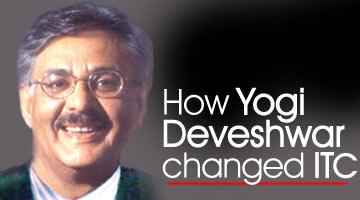
ITC chairman Y C Deveshwar, better known by his nickname Yogi, is a man who loves doing deals. It was no surprise, therefore, that he went out of his way to settle the 20-year-old tax dispute with the excise department of the central government earlier this week in pursuit of his stated intention to clean up the books of ITC and settle outstanding disputes and litigation.
Deveshwar inherited a slew of disputes from his predecessors when he assumed the mantle at ITC -- they ranged from unpaid tax notices through criminal cases filed by the government of Singapore and trade-related litigation in the US.
"Many would have described the inheritance as a crown of thorns but Deveshwar's commitment to the company has never wavered," say his compatriots in Kolkata.
Deveshwar has braved criticism over the years at successive annual general meetings, from shareholders who would have liked ITC to dip into its vast reserves and issue bonus shares or other forms of shareholder reward.
The chairman's position has been that the firm would be wise to conserve its resources till such time as the disputes could be resolved through a carrot and stick policy, of legal action and judicious pay-outs.
He has conveyed this message to agitated shareholders over the years through replies that were strong on both logic and charm, and disarmed them. To be fair, not all his deals have worked -- an offer to settle such a dispute in Singapore was not accepted by the administrators there.
So why did it work in India? It's because ITC is today seen as a true-blue Indian company (and Deveshwar can take credit for this too!) that has been investing in the rural economy and in crucial sectors of the economy much before such things became fashionable.
The company's investments in the creation of a unique information-technology-enabled rural information and trading network, called e-choupal, and India's first rural mall at Sehore, have transformed ITC from a multinational peddling cigarettes to a venture with firm roots and commitment in the Indian economy.
Its paper business has looked beyond the balance sheet through investments in social forestry programmes and environment-friendly technology. Its retailing and foods businesses have brought Indian products to the market without a hitch, and its hotels have Indian-ness at their heart.
As far as the tax dispute is concerned, some credit doubtlessly goes to the government for being so pragmatic as to gracefully accept the verdict of the apex court and withdrawing the ill-advised Ordinance that sought to recover unjust dues through executive action.
But just as much credit should go to Deveshwar's skill in cooling down what could have been a nasty run-in with the taxman.
"You can succeed in doing a deal only if you are convinced about what you are seeking to achieve and also if are sure you can carry others with you -- Deveshwar has achieved both," says a fellow professional manager and CEO.
The performance of ITC has silenced his critics on the board, including one-third shareholder BAT plc, which was initially very hostile to his plans to make ITC look beyond tobacco.
While the boardroom presence of Indian financial institutions, also with one-third shareholding in the company, might have helped the settlement with the government, Deveshwar was clearly balancing two sets of critics while doing this deal.
One the one hand, BAT could well have disputed the wisdom of paying anything in view of the favourable Supreme Court judgment, while on the other, the FIs could well have applied pressure for payment of the entire sum in the light of the Ordinance.
Deveshwar can justly claim the entire credit for reconciling these viewpoints through his conviction, and, of course, his trademark combination of hard logic and charm.





